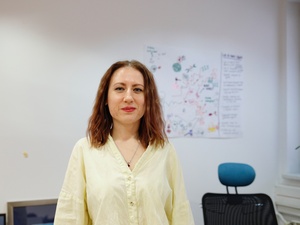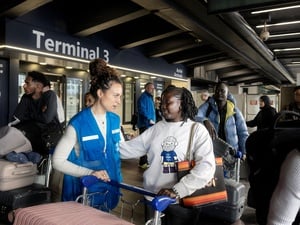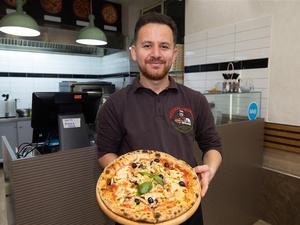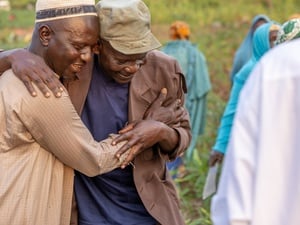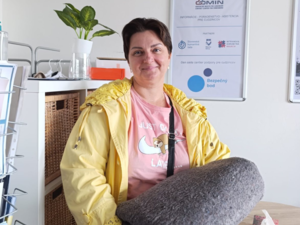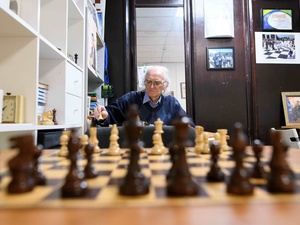Refugees struggle to reunite with their families: Stories of separation and hope
Refugees struggle to reunite with their families: Stories of separation and hope

Father Solomon embraces tightly his youngest son, Yoftahie, who has just landed to Athens with his mother and siblings under the gaze of female members of the Eritrean Orthodox congregation in Greece, who joined Father Solomon welcoming his family at the International Airport of Athens.
At the arrivals gate of “Eleftherios Venizelos” International Airport in Athens, the Solomon family embraces tightly. After 12 long years of separation, they are finally reunited. Solomon Mesein, a priest and symbolic figure for the Eritrean Orthodox congregation in Greece, has just welcomed his wife and three children to their new home.
When the Solomon family fled Eritrea due to persecution, Naemi was seven years old, her brother Bruck four, and little Yoftahie just 10 months old. In search of safety, the family had to separate - Father Solomon found refuge in Greece while his wife and children settled in Uganda. The children have few memories of their escape out of Eritrea but they remember growing up seeing their father only through video calls, sending him photos from milestones he had missed –school grades, church choirs, graduations.
“I wanted to bring my family here in a safe and legal way. I didn’t want them to risk their lives crossing the sea,” explains Father Solomon. Over the years, he heard countless tragic stories of friends and relatives who didn’t survive the journey to Europe. This only strengthened his resolve to endure every challenge in his long pursuit of reunification.
His efforts were supported by the Greek Council for Refugees (GCR), which provides legal aid for refugee family reunification in partnership with UNHCR, the UN Refugee Agency.
“It took 12 years and two court decisions to succeed, because the family was asked to do the impossible,”, explains Eleni Kagiou, GCR’s lawyer who, along with lawyer Chara Katsigianni, handled the case. “They were asked to provide documents they simply couldn’t obtain – especially since Father Solomon’s wife and children were no longer in their country of origin, Eritrea. This demand went against the basic legal principle that the impossible cannot be required”, adds Eleni.
Family reunification is based on the fundamental human right to family life and is recognized as a right for recognized refugees under both national and European law. However, many face years of delay due to complex procedures, requirements for documents that are simply unattainable, and the absence of Greek consulates in countries where the family members of refugees reside.
The specialized support provided by GCR and UNHCR has been essential for helping refugee families overcome these hurdles. But this work is now at risk. UNHCR, like many humanitarian organizations, is facing a serious funding crisis, and the future of critical programmes—like the legal aid project that reunited the Solomons—is uncertain. “If these services didn’t exist, so many families would remain apart, or take dangerous routes just to be together,” says Eleni. “Legal assistance is not a luxury—it’s a lifeline.”
The story of Karime: three generations of displaced Afghans
Only refugees living with the pain of separation truly understand how devastating these barriers can be. “Family means being with your loved ones,” says Karime Ganji, a refugee from Afghanistan, sighing once she finishes one of her daily video calls with her mother. Karime has applied for her mother, who now lives in Iran, to reunite with her in Greece. Her case, also handled by GCR, has been faced many obstacles similar to those of the Solomon family.
“I have been separated from my family since 2016. Two years ago, we lost my father, whom I hadn’t seen for seven years. My mother’s health has deteriorated since. Having your family close makes you stronger and gives you hope,” explains Karime, who was shaken when her father died while she was still trying to bring her parents to Greece. “My mother has a health condition. It got worse due to stress and loneliness. She needs care that I cannot provide while we are apart,” she adds.

Karime Ganji, is seen at the library of Deree -The American College of Greece, where she studies psychology on a scholarship. Karime is trying to balance a busy daily life working, studying and looking after her family in parallel with her efforts to support other refugee women like herself through “Hidden Goddess”, the organization she co-founded in Athens.
“Separation is hard. Your parents remind you who you are – your identity, your culture.”
Karime’s case, like many others, is further complicated because Greece has suspended the certification of documents issued by the de facto authorities in Afghanistan. Without flexibility, the process stalls. “I am independent. I have my own job. I don’t rely on anyone’s help. Why do they make it so complicated?” Karime wonders. Still, she refuses to give up.
Now living in Athens, Karime is raising her two children alone, working in the humanitarian sector, and studying psychology at the American College of Greece on a scholarship. She co-founded “Hidden Goddess”, a female refugee-led organization, which helps refugee women regain their strength and self-confidence.
“All people have the right and the fundamental need to be with their families. For refugees, losing their family along with their homeland can be a deep trauma,” says Maria Clara Martin, UNHCR Representative in Greece. “Quick and effective reunification procedures mean that refugees come to the country safely, and prevent refugees from resorting to dangerous journeys.”
She also warns of the danger posed by the current funding crisis. “Cuts to these programmes will have devastating consequences. Every delay in support means prolonged separation, unnecessary suffering, and lost opportunities to rebuild lives.”

Back in the Solomons’ living room in central Athens, a picture of the Virgin Mary holding the newborn Christ watches over the family. Their faith helped them endure each setback on the long road to reunification. Now they spend hours on the couch laughing, talking late into the night, and remembering the years apart. “We can’t bring back the 12 years we lost,” says Naemi. “I had to grow up fast, carrying the weight of being strong for my mom and dad. Now I’m finally starting to feel like a child again”.
Naemi had to interrupt the nursing studies she had started in Uganda, but she has faith in the future she is now rebuilding in Greece. She is learning Greek and adjusting to her new life, having already found a job in the tourism industry, all while enjoying the “unconditional love” that, as she says, a family can offer. “Reunification of families is not just about winning a case or bringing a family together. It’s about giving people hope,” she stresses.
Karime still longs for that hope, as she continues her busy daily life and her efforts to support other women like herself. “Even in paradise, it’s difficult without the ones you love”.

Karime spends a quiet moment with her youngest son, Iman, at a public park in Athens. A caring mother of two, she hopes to give her children a peaceful and happy life despite the challenges she has faced.
Hope Away From Home: Protection and Hope for People Seeking Safety
UNHCR’s Hope Away from Home campaign in Greece advocates for the protection of the right to family life for those who have sought safety in the country. A core priority of the campaign is to expand access to family reunification as a safe and legal pathway for refugees separated from their loved ones.
The legal assistance programme for refugee family reunification, implemented by the Greek Council for Refugees (GCR) in partnership with UNHCR, has supported 290 family reunification cases between 2021 and 2024. During this period, 145 people were successfully reunited with their families in Greece - often after years of uncertainty, waiting and hardship. These reunifications represent more than legal victories; they are moments of restored dignity and hope.
However, this critical work is now at risk. The current funding crisis faced by humanitarian organizations—including UNHCR—threatens to halt life-changing services such as legal support for refugee families. Without such support, families will remain separated, legal pathways will be blocked, and vulnerable individuals may be forced to resort to dangerous journeys.



